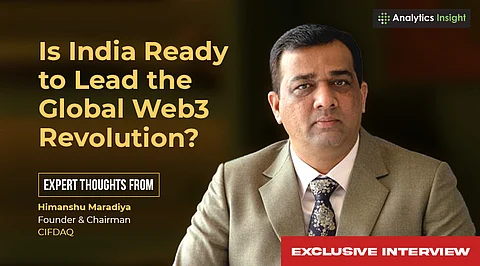Technology
India’s Himanshu Maradiya Champions Web3 Revolution at CIFDAQ

In a significant move towards reshaping the financial landscape, Mr. Himanshu Maradiya, Founder and Chairman of CIFDAQ, is pioneering India’s first comprehensive Web3 ecosystem. This venture aims to enhance regulatory compliance and user empowerment while simplifying the adoption of decentralized finance (DeFi) solutions. With over 25 years of experience in leadership roles, Maradiya’s transition from real estate to blockchain underscores a profound understanding of evolving industries and the potential technology holds for economic opportunities.
India is positioning itself as a global hub for Web3 innovation. Maradiya emphasizes the country’s unique advantages, such as a robust fintech infrastructure that includes approximately 450 million UPI users and 340 million merchant QR codes. He believes that by creating an interoperable infrastructure that links existing technology with global blockchain networks, India can lead the digital revolution with minimal effort from its citizens.
Building a Holistic Web3 Ecosystem
CIFDAQ, launched in 2021, endeavors to bridge traditional finance with DeFi by offering a full-stack, multi-asset trading and investment platform. Maradiya points out that while many platforms focus on niche segments, CIFDAQ stands out by combining a diverse range of trading options, including synthetic tickers for stocks, commodities, and cryptocurrencies, all in one place.
User security is a top priority for CIFDAQ. The platform employs Multi-Party Computing (MPC) wallets, which divide private keys into multiple encrypted segments, ensuring that no single party has complete access. This approach is designed to protect users from potential hacks and fraud. Additionally, CIFDAQ incorporates advanced Know Your Customer (KYC) verification processes and predictive security models, enhancing investor confidence.
With the regulatory landscape for cryptocurrencies tightening globally, Maradiya discusses the importance of navigating these changes effectively. The recent passing of the GENIUS Act in the United States and the European Union’s advancements in the Markets in Crypto-Assets (MiCA) regulation necessitate that cryptocurrency exchanges ensure compliance to avoid severe repercussions. Maradiya advocates for self-regulation, asserting that companies exceeding global regulatory standards can build trust across borders, which is crucial for the industry.
India’s Regulatory Framework and Future Prospects
Looking specifically at India, Maradiya highlights the need for a progressive licensing framework that mandates registration with the Financial Intelligence Unit (FIU). He argues that such measures would provide regulatory clarity, eliminate non-compliant players, and bolster investor trust. Furthermore, he asserts that a dedicated framework for DeFi protocols, including built-in KYC and anti-money laundering (AML) standards, is essential to maintain compliance while fostering innovation.
As the Indian government prepares to release its crypto regulation paper, Maradiya anticipates that enabling controlled cross-border crypto flows under a unified capital account framework will integrate India more seamlessly into the global digital economy. He believes that these regulatory guardrails will strike the right balance between innovation and compliance, positioning India as a leader in the digital asset space.
Maradiya also reflects on how Web3 is transforming the mindset of young investors and entrepreneurs. He observes that younger generations, such as Gen Z and millennials, are increasingly adept at navigating concepts like tokenomics and yield farming, constructing diversified portfolios that blend traditional and digital assets.
He advises young investors to approach Web3 with patience, viewing their investments as long-term opportunities rather than quick gains. Entrepreneurs are encouraged to leverage decentralized governance models and token-based crowdfunding to foster community engagement and create innovative business strategies.
As the Web3 landscape evolves, Maradiya emphasizes the importance of vigilance regarding regulatory changes and the need for rigorous security practices. By prioritizing user experience and focusing on solid fundamentals over hype, the next generation can unlock the transformative potential of decentralized technologies.
-

 Technology5 months ago
Technology5 months agoDiscover the Top 10 Calorie Counting Apps of 2025
-

 Health2 months ago
Health2 months agoBella Hadid Shares Health Update After Treatment for Lyme Disease
-

 Health3 months ago
Health3 months agoErin Bates Shares Recovery Update Following Sepsis Complications
-

 Technology4 months ago
Technology4 months agoDiscover How to Reverse Image Search Using ChatGPT Effortlessly
-

 Technology1 month ago
Technology1 month agoDiscover 2025’s Top GPUs for Exceptional 4K Gaming Performance
-

 Technology2 months ago
Technology2 months agoElectric Moto Influencer Surronster Arrested in Tijuana
-

 Technology5 months ago
Technology5 months agoMeta Initiates $60B AI Data Center Expansion, Starting in Ohio
-

 Technology5 months ago
Technology5 months agoRecovering a Suspended TikTok Account: A Step-by-Step Guide
-

 Health4 months ago
Health4 months agoTested: Rab Firewall Mountain Jacket Survives Harsh Conditions
-

 Lifestyle5 months ago
Lifestyle5 months agoBelton Family Reunites After Daughter Survives Hill Country Floods
-

 Technology4 months ago
Technology4 months agoHarmonic Launches AI Chatbot App to Transform Mathematical Reasoning
-

 Technology3 months ago
Technology3 months agoUncovering the Top Five Most Challenging Motorcycles to Ride





















